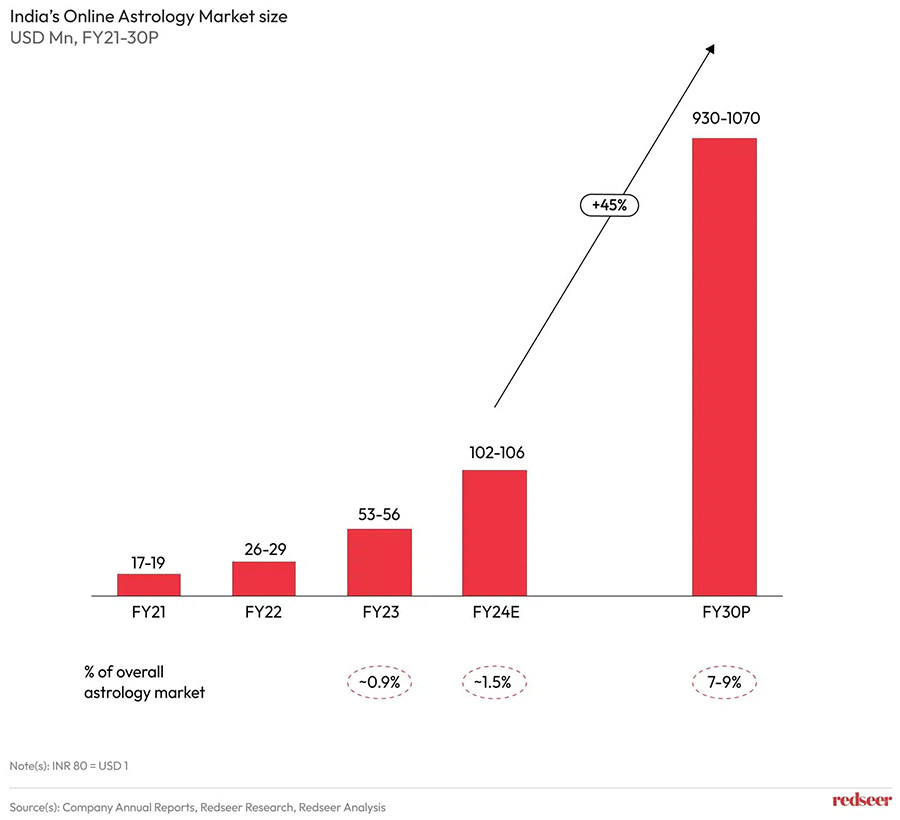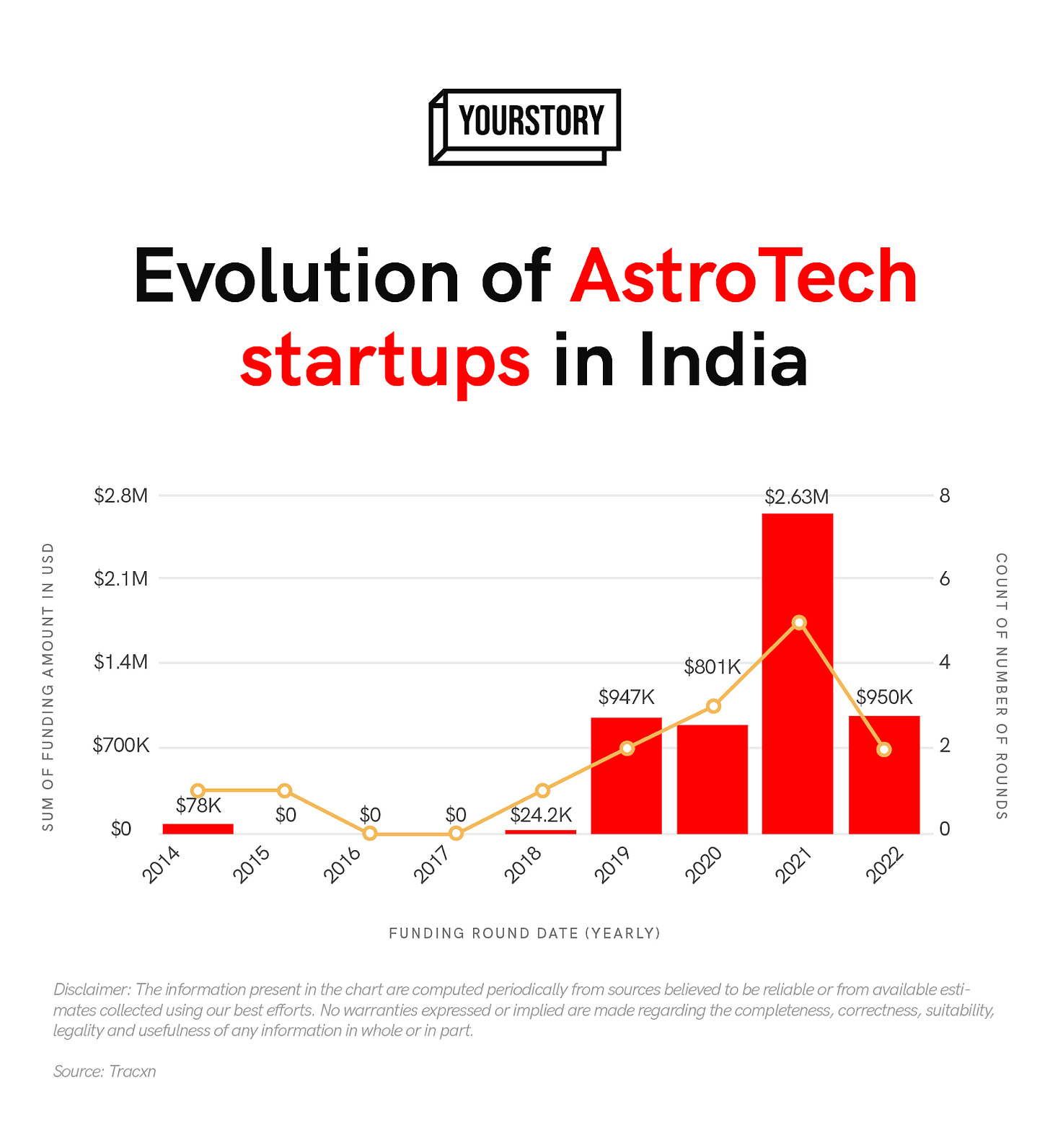TMI #001: India’s astrology industry is worth more than FMCG, and only 1.5% of it is online. We break down how apps, AI, and Gen Z are turning horoscopes into a booming tech business.
When was the last time you checked your horoscope?
Maybe it was before a big job interview. Or a bad breakup. Or perhaps it just popped up on your lock screen one Tuesday morning, sandwiched between a Swiggy notification and a missed call from your boss. Either way, if you’ve lived in India long enough, chances are you’ve consulted the stars at some point, whether through a priest, your mother, or a meme.
But here’s something you may not have seen coming; India’s astrology industry is now worth ₹3.2 lakh crore. That’s bigger than the entire FMCG market. And only 1.5% of that is online.
Yes, we’re still a country where people walk barefoot into temples and trust their family astrologer more than their financial advisor. But we’re also a country where teens are paying ₹200 to ask astrologers on WhatsApp-style apps when their soulmate will show up. Where 26-year-olds are getting AI-generated kundli readings delivered to their inbox before breakfast. Something unusual is happening. An ancient belief system is going full startup.

Astrology has always had a grip on India. From naming your child to deciding whether to buy a flat or fix a wedding date, the stars have always had a say. You’ll find someone selling gemstones to “fix your Shani” in every local market. And let’s not even get started on the family WhatsApp forwards every time there’s a lunar eclipse.
The size of the market was never in question. But what was interesting and problematic was how offline and chaotic it all was. Unorganised. Based on trust, referrals, and a lot of cash. There are 6.5 lakh temples in the country and probably just as many astrologers. But barely anyone had built a platform out of it.
Until the world shut down in 2020.
COVID pushed us indoors. Suddenly, going to meet an astrologer in person wasn’t an option. But the questions didn’t go away. If anything, they multiplied. “Will I lose my job?” “Will my business survive?” “Will I catch the virus?” And so, people went looking for answers on their phones. Astrotalk, one of the earliest players in the space, said it saw a 500% spike in traffic during the first lockdown. What began as a coping mechanism became a habit. And India’s digital backbone was ready for it.
By early 2024, we had over 950 million internet users and 700 million smartphones. With UPI, consultations became one-click payments. Platforms began offering 24x7 live consultations in regional languages. Refunds were possible. Ratings built credibility. Interfaces mimicked WhatsApp to the dot. Astrology didn’t just go digital. It went private. No awkward temple visits. No judgment. Just you, your chart, and someone on the other side of the screen telling you when things might get better.
That’s where things got even more interesting. Astrology went from being a seasonal ritual to a scalable product, due to a surprisingly modern strategy: the freemium model.
Take Astrotalk, for instance. You get five minutes of free chat with an astrologer. But of course, that’s just enough time to warm up. When it gets interesting, you’re hit with a prompt: ₹5 to continue. And by then, you’ve already bought in. It’s the classic hook. But it works. Astrotalk now clocks over 4.5 million paid sessions every month. Another 6 million are free. Many users end up spending ₹200 or more in one go. Some even pay ₹1,999 for deep-dive video consults. And yes, there’s a tier for “celebrity astrologers” who charge ₹200 per minute.
InstaAstro does it with zodiac coaching packs. AstroYogi offers instant matchmaking reports. AstroSage has gone full e-commerce with gemstones and smartwatch alerts. It’s astrology, gamified. And it’s working because people don’t just want predictions; they want access. They want someone to tell them things will be okay. And if an app can do that at 2 AM in Gujarati or Tamil? Even better.

But here’s the kicker. This isn’t being driven by your grandmother’s generation. It’s Gen Z and millennials who are powering this boom. A 2023 AstroYogi survey showed that 60% of its users were Gen Z.
In urban centres like Pune, Hyderabad, and Ahmedabad, astrology app usage is rising sharply. Women make up 60% of the user base on some platforms, often seeking career advice more than relationship insight. And the reason is simple. Astrology has always been about comfort during uncertainty. And let’s face it, nothing about life in your 20s is predictable anymore. So people are turning to the stars, not out of superstition, but out of a desire for control. It’s like therapy; but with Shani and Jupiter instead of Freud and Jung.
When a category gets this big and this sticky, it doesn’t take long for investors to notice. Venture capitalists have poured over $50 million into Indian astrology startups since 2015; up from just $88K back then. Astrotalk alone has raised over $34 million. InstaAstro got ₹18 crore. And Astrosure.ai raised $6 million; without hiring a single human astrologer. Instead, they launched a chatbot called Agastyaa, built to offer spiritual and emotional support with zero human interaction. It’s a belief but rebranded.
AI is changing the game entirely. Platforms are using LLMs to power smarter readings, scale consultations, and even create personalised astrology learning tools. AstroSage AI is building automated kundli engines. Astrotalk is investing in predictive modelling. One founder even compared it to a “big brain” — infinite neurons, infinite insights. AI isn’t replacing astrologers. It’s scaling them.
But wait. It gets weirder.
Because there’s one growing use case no one talks about. Astrology… for investing.
Yes, seriously.
Some traders are using planetary positions to time stock picks. Others swear by moon cycles before making high-stakes bets. Apps are now offering a wealth yog calculators and IPO date recommendations based on astrological windows. It’s still niche. But it’s sticky, especially among younger retail investors looking for any edge in volatile markets. In the West, apps like Moonly and Co-Star are already blending money with the metaphysical. India isn’t far behind.
Of course, not everything is perfectly aligned.
There are big challenges too. Credibility is one. Many users still complain about vague readings or astrologers making generic statements. Refunds help. But trust, once broken, is hard to rebuild, especially in a space that runs on faith. Regulation is another. Astrology isn’t clearly classified under health, finance, or religion. So it operates in a legal grey zone. And for investors? There’s still the elephant in the room that is promoter’s exits. No one has pulled off a blockbuster IPO yet. There’s no global benchmark to follow. That makes VCs excited… but cautious.
Still, if there’s one thing we know about India, it’s this: belief runs deep.
And when belief meets bandwidth, you don’t just get horoscopes. You get habits. You get revenue. You get a culturally rooted tech economy that no one saw coming but everyone is now paying attention to.
Astrology in India is an infrastructure. And the apps? They’re not just telling people the future anymore. They’re building it.
If you’ve made it this far, thanks for reading. We’ll be back next week, like clockwork.
Got a company, sector, or story you think we should dig into? Hit reply and tell us.
If we pick your suggestion, we’ll send some Filter Coffee merch your way.
Until next Sunday.
Coffee Crew out.




